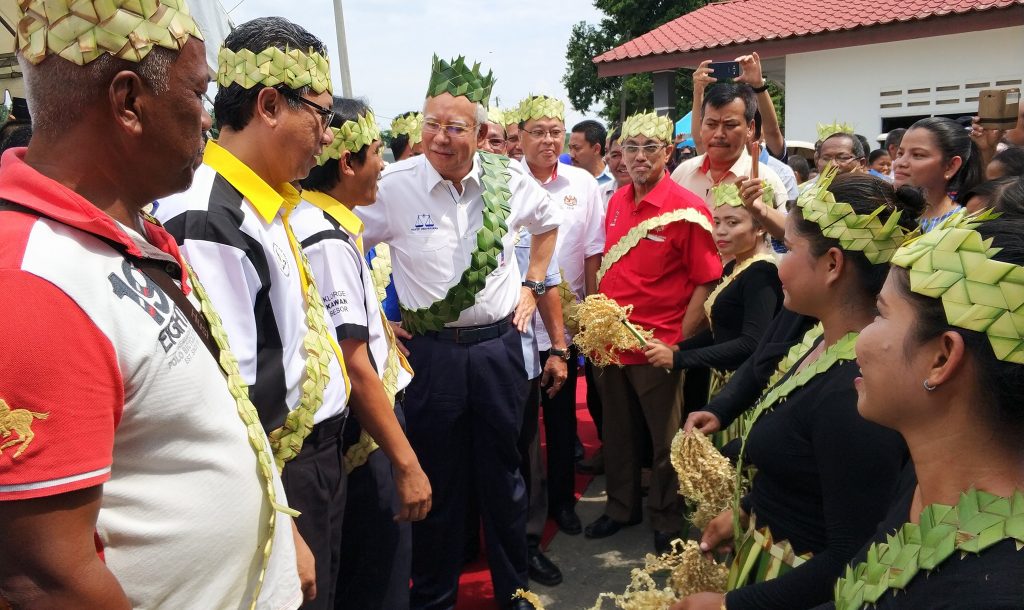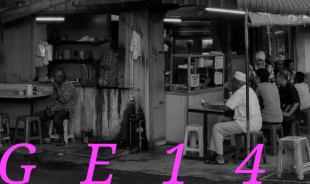In last week’s historic Malaysian election, the anticipated “Malay tsunami” instead became a “Malaysian tsunami”. As a Malaysiakini editorial noted, this “tide comprised not just the major ethnic groups in the peninsula—Malays, Chinese and Indians—but also those in Sabah and Sarawak”.
There is one group, however, that’s often forgotten—the peninsular Orang Asli (indigenous peoples). Here the electoral tsunami ebbed, and there were relatively few gains for the then opposition coalition Pakatan Harapan (PH) among Orang Asli voters. Instead Barisan Nasional (BN) seems to have retained a comfortable majority of Orang Asli votes, despite the significant ongoing problems facing their communities.
I spent time leading up to the election shadowing candidates and their teams in parliamentary constituencies in the state of Pahang, as well as visiting Orang Asli kampung (villages) and large open celebratory events that traditionally follow weddings (joget). Of particular interest to me was how the campaigns interacted with the Orang Asli, how the Orang Asli chose to vote, and the reasons why. I sat with numerous candidates in their discussions with kampung representatives, families and ketua (village heads), to listen to the exchanges and see the dynamics of the electioneering.
There were numerous complaints from those that attended the meetings. These primarily focused on their “forgotten” status, and how promises made had also been forgotten, leading to a great deal of anxiety and insecurity. There have been complaints in the past that the Orang Asli lie largely forgotten until the election season, where they are expected to make up part of Barison Nasional’s (BN) “fixed deposit” of votes.
There has been very little Orang Asli representation in politics. This year the Democratic Action Party (DAP) ran their first ever Orang Asli state candidate, in Kelantan (though he was only one out of 148 candidates fielded). This representation is still better than other parties, with Orang Asli candidates being newsworthy due to their rarity. In this election, only 3 state seat candidates were Orang Asli. Even the governmental organisation responsible for Orang Asli issues, the Orang Asli Development Department (JAKOA), saw its first Orang Asli Director-General appointed only two weeks ago (somewhat conveniently, during the election period).
On a more local level, Orang Asli voters’ concerns appear not to surround 1MDB or GST, but the amount of support villages get in their development. Discussions I witnessed between ketua and candidates emphasised complaints concerning insufficient governmental housing being built despite promises made (some villages were told they would have enough houses built for the majority of the residents, but in 5 years only 2 materialised in villages of around 200 people). Some kampung were concerned about the lack of basic utilities such as water, or inconsistent access to electricity.
One major concern was that Orang Asli land would be taken if resources such as bauxite were discovered, as they have no documents to prove ownership of the land they live on. There was a degree of desperation at the lack of opportunities and education, with concerns dominating that their children would be caught up in the same cycle of extreme anxiety and insecurity in day to day life.
In these constituencies, however, election results and my preliminary discussions on the ground suggest that the Orang Asli voted overwhelmingly for BN. In the federal and state electoral districts I was based in, BN candidates won and PH made very few advances, winning no seats and closing the majority only a small bit.
This was a common trend in federal constituencies in Pahang. In Rompin 8.45% of the population are Orang Asli, and BN had a comfortable win with a majority of 11,395 votes. Despite Mahathir visiting Pekan (Najib’s seat), BN won after garnering the support of the Orang Asli communities. Orang Asli make up 7.86% of the population, and BN won with a majority of 24, 859 votes. The Cameron Highlands was closer, where the Orang Asli make up the largest percentage, 21.56% of residents, but BN still claimed the seat with a majority of only 597.
This trend is clearer at the state level. In Jelai (the seat of new Menteri Besar Wan Rosdy Wan Ismail) Orang Asli voters (33.82% of the population) helped push BN to a majority of 3,507 votes. The same occurred in all state seats with large proportions of Orang Asli; Batu Talam, Bebar, Chini, Jenderak, Kemayan, Bukit Ibam, Muadzham Shah, and Tioman. BN won, and opposition parties (both PAS and PH) failed to make much headway.
Despite BN’s overall dominance, complaints did arise. It was clear that there was dissatisfaction with the gap between promises made and development delivered, with some ketua making the point that BN had had 60 years to deliver, and patience was wearing thin.
As one family head shared to a PH parliamentary candidate, in a village just on the edge of a major road, “me and my family have voted for BN each time. We always have. But what have they given us? They say: more houses, more help, but so far we have nothing to show for it, it has been too long.”
A ketua from a kampung 10 kilometres away told the candidate: “They tell us our land is safe…but we hear, land is being taken in other areas. It is safe for now…who knows what will happen next? I don’t know what will happen next. How can we stop it? Others haven’t been able to.”
Still, it seems that BN has maintained its safe deposit of Orang Asli votes in GE14 despite hopes among advocates, even 8 years ago, that there would be a significant shift. Why can BN depend on the Orang Asli despite these concerns? This was one thing I wanted to find out as part of a wider study on the engagement between Orang Asli and politics.
On paper, PH candidates did everything right to inspire a tsunami to occur, just as they did amongst other races. They visited people in their villages, with representatives from Orang Asli NGOs helping out on the ground. They engaged, listening to the concerns of the people themselves, and made promises about a better future whereby land would be protected and development would occur without constant delays. They gave out T-shirts, hats and flags, with promises of more. They also told villagers to ignore the cash gifts from BN, and instead take the money but vote with their conscience.
But I witnessed significant issues with the opposition’s campaign that put the Orang Asli off changing their minds. Among attendees I spoke to in the days following the meetings, many were unhappy with the apathy or “arrogance” shown by PH candidates towards the Orang Asli. One spoke to me of the fact that “[the candidate] didn’t seem to care, [they] talk about GST and what [PH] will do in parliament, but it doesn’t matter to us if things stay the same here.”
In one extreme example, a family head spoke unhappily about how the PH parliamentary candidate kept forgetting the name of their kampung (asking their entourage numerous times), and the fact that after they found out he only represented a family of 30, and not a village of 200, the candidate seemed to stop listening. This was made worse when, instead of engaging, the candidate kept insisting that the family vote for them. The family head told me “it’s like [he/she] doesn’t care at all, to [them] we are just votes, if they can’t remember us now, how will they remember us after the vote?”
In other villages, Orang Asli seemed unhappy that they were given only a small number of T-shirts and hats and promised more later on. A ketua joked that “[they] have already given us little but promises”—which raised laughs at the time, but created disappointment on polling days when the aforementioned clothes had still not been delivered. Following this day of meetings, I shared a car back with the person who had organised them, and even he, a die-hard PH activist, seemed dejected at the opposition’s perceived failures.
This is not to say all candidates were failures, or that all failures were the fault of PH. Some PH candidates—especially those running for state seats, who were more “local”—were a lot more successful in their discussions, and made a much better impression.
Another issue was the sheer amount of obstacles the opposition faced. Even when meetings had been organised, few people turned up. In villages of 200 people the candidate entourages outnumbered the amount of people who came, when only 10 orang Asli arrived, and only 5 actually spoke. When gatherings reached more than 15 or 20, it seemed to inhibit two-way discussions and just became about people speaking (down) to the attendees.
Ultimately, the muted reception the opposition’s campaign received in these communities is in part a reflection of the resilience of the BN grassroots machinery there. BN (and UMNO in particular) has a much stronger grassroots presence in Orang Asli communities than PH. BN mobilise not only their candidates, but their extended networks of activists throughout the villages. This gives the perception that they are closer to the ground and more invested in the concerns and problems that the Orang Asli face. While I did not witness it myself, there have been complaints in the past that they have utilised JAKOA and Peninsula Malaysia Orang Asli Association (POASM) to mobilise support, with the POASM president openly supporting BN. This furthers this perception that BN are not only more capable, but also more invested.
What mattered in GE14: campaigns, Islam, 1MDB, cost of living
How scholars of Malaysian politics reflected on the campaign as results rolled in on 9 May.
Therefore, for PH to make inroads in the Orang Asli community, more engagement is required. It is unlikely we will see a “Orang Asli” tsunami in the peninsula until PH’s grassroots campaigning in Orang Asli communities improves, in order to effectively counter that of BN. It will be interesting to see whether PH will use their new found governmental resources to cause this shift, and effectively engage with the Orang Asli and their continuing concerns.
The Orang Asli need to be given the opportunity to break the silence that their lack of representation has forced upon them. If this doesn’t occur, then perhaps the “fixed deposit” of Orang Asli votes can weather the storm that has disrupted BN so strongly, just as it has done until now.
 Facebook
Facebook  Twitter
Twitter  Soundcloud
Soundcloud  Youtube
Youtube  Rss
Rss 
